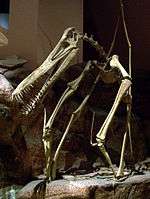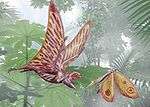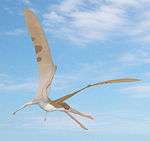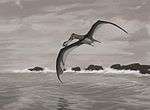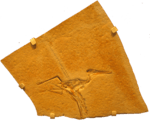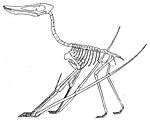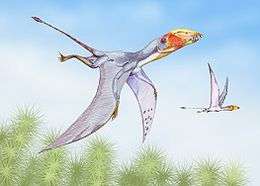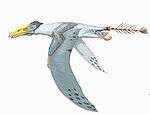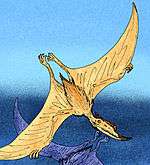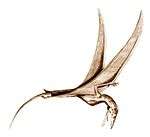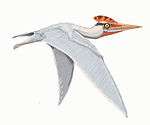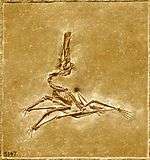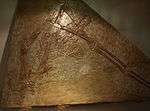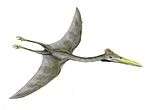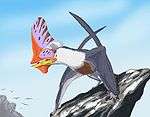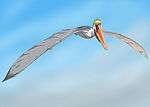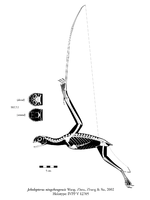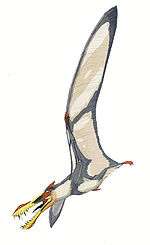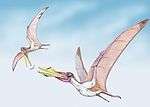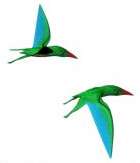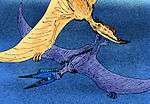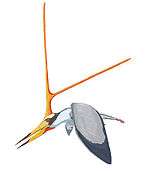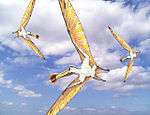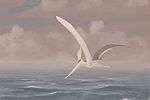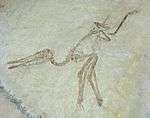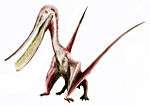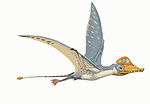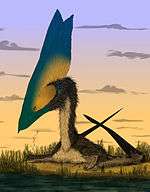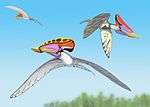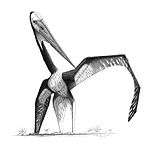Pterozorlar listesi
Pterozorlar listesi, yerel dilde yazılan terimler de dahil olmak üzere Pterosauria takımına dahil edilen tüm cinsleri alfabetik bir sıralama ile göstermektedir. Liste yaygın bir şekilde kabul edilmiş olan geçerli tüm cinslerin adlarını içerdiği gibi günümüzde artık geçerli olmayan cins isimlerine, şüpheli olarak görülen adlara (nomen dubium), resmi olarak yayınlanmayan veya açıklanmamış olan terimlere (nomen nudum), bunun yanında daha geçerli olan isimlerin genç sinonimlerine ve de artık pterozor olarak kabul edilmeyen canlı grublarının isimlerine de buna dair bilgi vermek açısından yer vermektedir. Aşağıdaki listede toplam olarak 179 farklı cins ismi bulunmaktadır.
Kapsam ve terminoloji
Standart olarak resmi bir şekilde kabul edilmiş Pterozor cinsleri listesi bulunmamakla beraber bunda dair bir deneme teşebbüsü Mikko Haaramo'nun Flogeni Arşivinde[1], Mike Hanson'un Pterosauria Cinsleri Dizininde,[2] buna ek olarak ilave edilen Pterozor Türleri Listesi'nde[3] ve dördüncül olarak Donald F. Glut'un Dinozorlar Ansiklopedisi isimli çalışmalarında yer almaktadır.[4]
Yazar ve yıllar
Yazarlar sütunu, cinsler listesinin oluşturulmasında resmi açıklamalarda bulunmuş ve bu cinsi ilk olarak tanımlamış olan yazarların listesini sıralar. Buna rağmen yazar isimleri her zaman örnek türü tanımlamış olan bir yazarın ismiyle aynı olmayabilir. Bazı durumlarda belirli bir cinse ait olduğu düşünülen bir tür daha sonra yeterli ölçüde detaylı bir şekilde belirlendiğinde bu türün aslında kendi başına bir cins olduğu saptanabilir ve yeni bir cins ismiyle tanımlanabilir. Bu durumda listede sadece onu yeni bir cins olarak tanımlamış olan son yazarın ismi yer almaktadır. Yıl sütunu ise cins olarak tanımlandığı yılı belirtmektedir.
Sınıflandırılma durumu
Adlandırma kuralları ve terminoloji, Uluslararası Zoolojik Adlandırma Kodu'nda (ICZN) belirlenmiş olan terim ve kuralları kapsar. Listede kullanılan teknik terimler şunlardır:
- Genç sinonim, (junior synonyms) : Daha önce yayınlanan isimlendirme ile aynı anlama gelen isim. İki veya daha fazla cins resmen belirlenmiş ve biyolojik tipi daha sonra aynı cins olduğunu gösteriyorsa ilk yayınlanan (kronolojik sırayla) yaşlı sinonimdir ve diğer bütün örnekleri genç sinonimdir (junior synonyms). Senior synonyms (yaşlı sinonim) isimler ICZN aksini belirtmedikçe genellikle öncelikli kullanılırlar (bkz.Tyrannosaurus).
- Nomen nudum (Latince "çıplak isim"): Yayınlarda yer alan ancak henüz resmi olarak ICZN standartlarına göre yayınlanmamış isimdir. Nomina nuda (çoğulu).
- Nomen oblitum (Latince "unutulan isim"): Özgün isim teklifi sunumundan sonra elli yıl bilim dünyasında kullanılmamış olan isimdir.
- Başka şekilde kullanılan isim: Resmi olarak yayınlanan ancak zaten başka bir isimlendirmede kullanılan isimlerdir. Bu ikinci kullanım (tüm sonraki kullanımları gibi) geçersizdir ve adının değiştirilmesi gerekir. Başka şekilde kullanılan isim geçerli jenerik isim değildir.
- Nomen dubium (Latince "şüpheli isim"): Benzersiz tanısal özellikleri olmayan fosilleri nitelendiren isimdir. Bu son derece öznel ve tartışmalı bir isimlendirme olabilir (bakınız Hadrosaurus) bu yüzden bu listede yer almamıştır.
Jeolojik çağ
"Çağ" sütunu, jeolojik zamanda fosilin tarihlendirilmiş olduğu kayaç serisini belirtir. Kısaltma listesi aşağıdaki şekildedir.
- uT: Yukarı Triyas
- lJ: Aşağı Jura Devri
- mJ: Orta Jura Devri
- uJ: Yukarı Jura Devri
- lK: Aşağı Kretase
- uK: Yukarı Kretase
Geçersiz, yanlış tanımlanan veya geçerli bir pretozoru temsil etmeyen cins isimleri çağ sütununda "Kullanılamaz" olarak listelenmiş olmakla beraber bu isimde bir pterozorun aslında hiçbir çağda yaşamamış olduğu da bu yüzden göz önüne alınmalıdır.
Bulunduğu yer ve notlar
Konumu sütununda bahsedilen cinse ait olan kalıntıların bulundu coğrafi bölge belirtilmiştir. Bölge olarak, Küba gibi küçük kara parçaları dışında genel olarak kıta isimleri kullanılmıştır. Siyasi veya politik olarak belirlenmiş olan bölgeler Mezozoik zamanda henüz olmadıkları için bu isimler cinslerin bulunduğu yerleri tanımlamak için geçersizdir. Geçersiz, yanlış tanımlanan veya geçerli bir pretozoru temsil etmeyen cins isimleri yer sütununda "Kullanılamaz" şeklinde listelenmiş olmakla beraber bu isimde bir pterozorun aslında hiçbir yerde yaşamamış olduğu da bu nedenle göz önüne alınmalıdır.
Notların yer aldığı sütun, bilimsel önemi ve taksonomik tarihinin listelendiği cinslere dair bilgilere yer vermekle beraber diğer sütunlarda sunulan bilgi ve verilerin derlemelerine dair açıklamaları da içerir.
Liste
Cinsler
| Pterozorlar listesi | |||||||||||||||||||||||||||||||||||||||||||||||||||||||||||||||||||||||||||||||||||||||||||||||||||||||||||||||||||||||||||||||||||||||||||||||||||||||||||||||||||||||||||||||||||||||||||||||||||||||||||||||||||||||||||||||||||||||||||||||||||||||||||||||||||||||||||||||||||||||||||||||||||||||||||||||||||||||||||||||||||||||||||||||||||||||||||||||||||||||||||||||||||||||||||||||||||||||||||||||||||||||||||||||||||||||||||||||||||||||||||||||||||||||||||||||||||||||||||||||||||||||||||||||||||||||||||||||||||||||||||||||||||||||||||||||||||||||||||||||||||||||||||||||||||||||||||||||||||||||||||||||||||||||||||||||||||||||||||||||||||||||||||||||||||||||||||||||||||||||||||||||||||||||||||||||||||||||||||||||||||||||||||||||||||||||||||||||||||||||||||||||||||||||||||||||||||||||||||||||||||||||||||||||||||||||||||||||||||||||||||||||||||||||||||||||||||||||||||||||||||||||||||||||||||||||||||||||||||||||||||||||||||||||||||||||||||||||||||||||||||||||||||||||||||||||||||||||||||||||
|---|---|---|---|---|---|---|---|---|---|---|---|---|---|---|---|---|---|---|---|---|---|---|---|---|---|---|---|---|---|---|---|---|---|---|---|---|---|---|---|---|---|---|---|---|---|---|---|---|---|---|---|---|---|---|---|---|---|---|---|---|---|---|---|---|---|---|---|---|---|---|---|---|---|---|---|---|---|---|---|---|---|---|---|---|---|---|---|---|---|---|---|---|---|---|---|---|---|---|---|---|---|---|---|---|---|---|---|---|---|---|---|---|---|---|---|---|---|---|---|---|---|---|---|---|---|---|---|---|---|---|---|---|---|---|---|---|---|---|---|---|---|---|---|---|---|---|---|---|---|---|---|---|---|---|---|---|---|---|---|---|---|---|---|---|---|---|---|---|---|---|---|---|---|---|---|---|---|---|---|---|---|---|---|---|---|---|---|---|---|---|---|---|---|---|---|---|---|---|---|---|---|---|---|---|---|---|---|---|---|---|---|---|---|---|---|---|---|---|---|---|---|---|---|---|---|---|---|---|---|---|---|---|---|---|---|---|---|---|---|---|---|---|---|---|---|---|---|---|---|---|---|---|---|---|---|---|---|---|---|---|---|---|---|---|---|---|---|---|---|---|---|---|---|---|---|---|---|---|---|---|---|---|---|---|---|---|---|---|---|---|---|---|---|---|---|---|---|---|---|---|---|---|---|---|---|---|---|---|---|---|---|---|---|---|---|---|---|---|---|---|---|---|---|---|---|---|---|---|---|---|---|---|---|---|---|---|---|---|---|---|---|---|---|---|---|---|---|---|---|---|---|---|---|---|---|---|---|---|---|---|---|---|---|---|---|---|---|---|---|---|---|---|---|---|---|---|---|---|---|---|---|---|---|---|---|---|---|---|---|---|---|---|---|---|---|---|---|---|---|---|---|---|---|---|---|---|---|---|---|---|---|---|---|---|---|---|---|---|---|---|---|---|---|---|---|---|---|---|---|---|---|---|---|---|---|---|---|---|---|---|---|---|---|---|---|---|---|---|---|---|---|---|---|---|---|---|---|---|---|---|---|---|---|---|---|---|---|---|---|---|---|---|---|---|---|---|---|---|---|---|---|---|---|---|---|---|---|---|---|---|---|---|---|---|---|---|---|---|---|---|---|---|---|---|---|---|---|---|---|---|---|---|---|---|---|---|---|---|---|---|---|---|---|---|---|---|---|---|---|---|---|---|---|---|---|---|---|---|---|---|---|---|---|---|---|---|---|---|---|---|---|---|---|---|---|---|---|---|---|---|---|---|---|---|---|---|---|---|---|---|---|---|---|---|---|---|---|---|---|---|---|---|---|---|---|---|---|---|---|---|---|---|---|---|---|---|---|---|---|---|---|---|---|---|---|---|---|---|---|---|---|---|---|---|---|---|---|---|---|---|---|---|---|---|---|---|---|---|---|---|---|---|---|---|---|---|---|---|---|---|---|---|---|---|---|---|---|---|---|---|---|---|---|---|---|---|---|---|---|---|---|---|---|---|---|---|---|---|---|---|---|---|---|---|---|---|---|---|---|---|---|---|---|---|---|---|---|---|---|---|---|---|---|---|---|---|---|---|---|---|---|---|---|---|---|---|---|---|---|---|---|---|---|---|---|---|---|---|---|---|---|---|---|---|---|---|---|---|---|---|---|---|---|---|---|---|---|---|---|---|---|---|---|---|---|---|---|---|---|---|---|---|---|---|---|---|---|---|---|---|---|---|---|---|---|---|---|---|---|---|---|---|---|---|---|---|---|---|---|---|---|---|---|---|---|---|---|---|---|---|---|---|---|---|---|---|---|---|---|---|---|---|---|---|---|---|---|---|---|---|---|---|---|---|---|---|---|---|---|---|---|---|---|---|---|---|---|---|---|---|---|---|---|---|---|---|---|---|---|---|---|---|---|---|---|---|---|---|---|---|---|---|---|---|---|---|---|---|---|---|---|---|---|---|---|---|---|---|---|---|---|---|---|---|---|---|---|---|---|---|---|---|---|---|---|---|---|---|---|---|---|---|---|---|---|---|---|---|---|---|---|---|---|---|---|---|---|---|---|---|---|---|---|---|---|---|---|---|---|---|---|---|---|---|---|---|---|---|---|---|---|---|---|---|---|---|---|---|---|---|---|---|---|---|---|---|---|---|---|---|---|---|---|---|---|---|---|---|---|---|---|---|---|---|---|---|---|---|---|---|---|---|---|---|---|---|---|---|---|---|---|---|---|---|---|---|---|---|---|---|---|---|---|---|---|---|---|---|---|
|
| ||||||||||||||||||||||||||||||||||||||||||||||||||||||||||||||||||||||||||||||||||||||||||||||||||||||||||||||||||||||||||||||||||||||||||||||||||||||||||||||||||||||||||||||||||||||||||||||||||||||||||||||||||||||||||||||||||||||||||||||||||||||||||||||||||||||||||||||||||||||||||||||||||||||||||||||||||||||||||||||||||||||||||||||||||||||||||||||||||||||||||||||||||||||||||||||||||||||||||||||||||||||||||||||||||||||||||||||||||||||||||||||||||||||||||||||||||||||||||||||||||||||||||||||||||||||||||||||||||||||||||||||||||||||||||||||||||||||||||||||||||||||||||||||||||||||||||||||||||||||||||||||||||||||||||||||||||||||||||||||||||||||||||||||||||||||||||||||||||||||||||||||||||||||||||||||||||||||||||||||||||||||||||||||||||||||||||||||||||||||||||||||||||||||||||||||||||||||||||||||||||||||||||||||||||||||||||||||||||||||||||||||||||||||||||||||||||||||||||||||||||||||||||||||||||||||||||||||||||||||||||||||||||||||||||||||||||||||||||||||||||||||||||||||||||||||||||||||||||||||
Ayrıca bakınız
- Pterozor (Pterosauria)
- Dinozorlar listesi
- Pleziozorlar listesi (Plesiosauria)
Kaynakça
- ↑ Haaramo, Mikko (15 November 2005). "Pterosauria". Mikko's Phylogeny Archive. http://www.fmnh.helsinki.fi/users/haaramo/Metazoa/Deuterostoma/Chordata/Archosauria/Pterosauria/Pterosauria_1.htm. Erişim tarihi: 29 March 2007.
- 1 2 3 4 5 6 7 8 9 10 11 12 13 14 15 16 17 18 Hanson, Mike (12 October 2005). "Genus Index". The Pterosauria (Archosauria.org). http://www.archosauria.org/pterosauria/taxonomy/genera.html. Erişim tarihi: 29 March 2007.
- ↑ Hanson, Mike (30 September 2006). "The Pterosaur Species List" (pdf). The Pterosauria (Archosauria.org). http://archosauria.org/pterosauria/taxonomy/species.pdf. Erişim tarihi: 27 July 2007.
- ↑ Glut, Donald F. (2006). "Appendix One: Pterosaurs". Dinosaurs: The Encyclopedia. 4th Supplement. Jefferson, North Carolina: McFarland & Company, Inc.. s. 583–633. ISBN 0-7864-2295-5.
- ↑ Myers, Timothy S. (2010). "A new ornithocheirid pterosaur from the Upper Cretaceous (Cenomanian–Turonian) Eagle Ford Group of Texas". Journal of Vertebrate Paleontology 30 (1): 280–287. DOI:10.1080/02724630903413099.
- 1 2 Nesov, Lev A. (1981) (Russian). [Flying reptiles from the Late Cretaceous of Kyzyl-Kum]. 15. s. 98–104.
- ↑ Ibrahim, N., Unwin, D.M., Martill, D.M., Baidder, L. and Zouhri, S. (2010). "A New Pterosaur (Pterodactyloidea: Azhdarchidae) from the Upper Cretaceous of Morocco." PLoS ONE, 5(5): e10875. DOI:10.1371/journal.pone.0010875
- 1 2 3 4 5 6 7 8 9 10 11 12 13 14 15 16 17 18 19 20 21 22 23 24 25 26 27 28 29 Unwin, David M. Appendix: List of Valid Pterosaur Species. Pterosaurs From Deep Time. New York: Pi Press, 2006. ISBN 0-13-146308-X
- ↑ Campos, D. A., and Kellner, A. W. A. (1985). "Panorama of the Flying Reptiles Study in Brazil and South America (Pterosauria/ Pterodactyloidea/ Anhangueridae)." Anais da Academia Brasileira de Ciências, 57(4):141–142 & 453-466
- ↑ Döderlein, L. (1923). "Anurognathus ammoni ein neuer Flugsaurier." Sitzungsberichte der Mathematisch-Naturwissenschaftlichen Abteilung der Bayerischen Akademie der Wissenschaften zu München, 1923, 117-164.
- 1 2 "Anurognathus." In: Cranfield, Ingrid (ed.). The Illustrated Directory of Dinosaurs and Other Prehistoric Creatures. London: Salamander Books, Ltd. Pp. 306-307.
- ↑ Williston, Samuel W. (1903). "On the osteology of Nyctosaurus (Nyctodactylus), with notes on American pterosaurs". Field Museum Publications (Geological Series) 2 (3): 125–163.
- ↑ Nesov, L.A., Kanznyshkina, L.F., and Cherepanov, G.O. (1987). "Dinosaurs, crocodiles and other archosaurs from the Late mesozoic of central Asia and their place in ecosystems." Abstracts of the 33rd session of the All-Union Palaeontological Society, Leningrad, pp. 46-47. [In Russian].
- ↑ Averianov, A.O. (2007). "New records of azhdarchids (Pterosauria, Azhdarchidae) from the late Cretaceous of Russia, Kazakhstan, and Central Asia". Paleontological Journal 41 (2): 189–197. DOI:10.1134/S0031030107020098.
- 1 2 3 Eberhard Frey, Christian A. Meyer and Helmut Tischlinger (2011). "The oldest azhdarchoid pterosaur from the Late Jurassic Solnhofen Limestone (Early Tithonian) of Southern Germany". Swiss Journal of Geosciences 104. DOI:10.1007/s00015-011-0073-1.
- ↑ Kellner, Alexander W.A.; Taissa Rodrigues and Fabiana R. Costa (2011). "Short note on a pteranodontoid pterosaur (Pterodactyloidea) from western Queensland, Australia". Anais da Academia Brasileira de Ciências 83 (1): 301–308. DOI:10.1590/S0001-37652011000100018. http://www.scielo.br/pdf/aabc/v83n1/v83n1a18.pdf.
- ↑ Peters, David (2004). "Did pterosaurs lay eggs?". Prehistoric Times 67: 21. 2005-02-11 tarihinde kaynağından arşivlendi. http://web.archive.org/web/20050211215207/http://pterosaurinfo.com/avgodectes.html.
- ↑ Nesov, L. A. (1984). ["Upper Cretaceous pterosaurs and birds from Central Asia."] Paleontologicheskii Zhurnal, 1984(1), 47-57.
- ↑ Ösi, Attila; Weishampel, David B.; and Jianu, Coralia M. (2005). "First evidence of azhdarchid pterosaurs from the Late Cretaceous of Hungary". Acta Palaeontologica Polonica 50 (4): 777–787. 2006-09-25 tarihinde kaynağından arşivlendi. http://web.archive.org/web/20060925135545/http://app.pan.pl/acta50/app50-777.pdf. Erişim tarihi: 2007-03-04.
- ↑ Ross A. Elgin and Eberhard Frey (2011). "A new ornithocheirid, Barbosania gracilirostris gen. et sp. nov. (Pterosauria, Pterodactyloidea) from the Santana Formation (Cretaceous) of NE Brazil". Swiss Journal of Palaeontology 130. DOI:10.1007/s13358-011-0017-4. http://www.springerlink.com/content/86566qm360107123/.
- ↑ Rjabinin A. N., 1948, "Remarks on a flying reptile from the Jurassic of the Kara-Tau", Akademia Nauk, Paleontological Institute, Trudy, 15(1): 86-93
- 1 2 "Batrachognathus." In: Cranfield, Ingrid (ed.). The Illustrated Directory of Dinosaurs and Other Prehistoric Creatures. London: Salamander Books, Ltd. Pp. 320-321.
- ↑ Lü J.-C., 2003, A new pterosaur: Beipiaopterus chenianus, gen. et sp. nov. (Reptilia: Pterosauria) from Western Liaoning Province, China. Memoir of the Fukui Prefectural Dinosaur Museum 2: 153-160.
- ↑ Nesov, L.A. and Yarkov, A.A. (1989). “New Birds from the Cretaceous–Paleogene of the USSR and Some Remarks on the History of Origin and Evolution of the Class.” Tr. Zool. Inst. Akad. Nauk SSSR, 197: 78–97.
- ↑ Junchang Lü; and Qiang Ji (2005). "A new ornithocheirid from the Early Cretaceous of Liaoning Province, China". Acta Geologica Sinica 79 (2): 157–163.
- ↑ Kellner, A. W. A. (1984). "Ocorrencia de uma mandibula de pterosauria (Brasileodactylus araripensis, nov. gen.; nov. sp.) na Formacao Santana, Cretaceo da Chapada do Araripe, Ceara-Brasil." Anais XXXIII Cong. Brasil. de Geol, 578–590. Rio de Janeiro.
- ↑ Gasparini, Zulma; Fernández, Marta; and de la Fuente, Marcelo (2004). "A new pterosaur from the Jurassic of Cuba". Palaeontology 47 (4): 919–927. DOI:10.1111/j.0031-0239.2004.00399.x. http://www.blackwell-synergy.com/links/doi/10.1111/j.0031-0239.2004.00399.x/pdf. Erişim tarihi: 2007-03-03.
- ↑ Plieninger, F. 1895 "Campylognathus Zitteli, ein neuer Flugsaurier aus dem obersten Lias Schwabens", Paläontographica 41, 193–222 & pl. 19.
- 1 2 "Campylognathoides." In: Cranfield, Ingrid (ed.). The Illustrated Directory of Dinosaurs and Other Prehistoric Creatures. London: Salamander Books, Ltd. Pp. 296-297.
- 1 2 Dalla Vecchia, Fabio M. (2009). "Anatomy and systematics of the pterosaur Carniadactylus (gen. n.) rosenfeldi (Dalla Vecchia, 1995)". Rivista Italiana de Paleontologia e Stratigrafia 115 (2): 159–188.
- ↑ Xiaolin, Wang; and Zhonghe, Zhou (2006). "Pterosaur assemblages of the Jehol Biota and their implication for the Early Cretaceous pterosaur radiation". Geological Journal 41 (3-4): 405–418. DOI:10.1002/gj.1046.
- ↑ Xiaolin, Wang; Zhou, Zhonghe (2006). "Pterosaur adaptational radiation of the Early Cretaceous Jehol Biota". Yuan, Xunalai; Fang, Zongjie; Zhou, Zhonghe ve diğ.. Originations and Radiations—Evidences from the Chinese Fossil Record. Beijing: Science Press. ss. 665–689, 937–938.
- ↑ Steel, L., Martill, D.M., Unwin, D.M. and Winch, J. D. (2005). A new pterodactyloid pterosaur from the Wessex Formation (Lower Cretaceous) of the Isle of Wight, England. Cretaceous Research, 26, 686-698.
- ↑ Fröbisch, N.B.; and Fröbisch, J. (2006). "A new basal pterosaur genus from the upper Triassic of the Northern Calcareous Alps of Switzerland". Palaeontology 49 (5): 1081–1090. DOI:10.1111/j.1475-4983.2006.00581.x. http://www.blackwell-synergy.com/doi/abs/10.1111/j.1475-4983.2006.00581.x. Erişim tarihi: 2007-03-02.
- ↑ Leonardi, G. & Borgomanero, G. (1985). "Cearadactylus atrox nov. gen., nov. sp.: novo Pterosauria (Pterodactyloidea) da Chapada do Araripe, Ceara, Brasil." Resumos dos communicaçoes VIII Congresso bras. de Paleontologia e Stratigrafia, 27: 75–80.
- ↑ Lü, J. (2009). "A new non-pterodactyloid pterosaur from Qinglong County, Hebei Province of China." Acta Geologica Sinica (English Edition), 83(2): 189-199. doi: 10.1111/j.1755-6724.2009.00062.x.
- ↑ Wang Xiao-Lin; and Zhou Zhong-He (2003). "Two new pterodactyloid pterosaurs from the Early Cretaceous Jiufotang Formation of Western Liaoning, China". Vertebrata PalAsiatica 41 (1): 34–41.
- ↑ Galton, P.M. (1981). A rhamphorhynchoid pterosaur from the Upper Jurassic of North America. Journal of Paleontology 55:1117–1122.
- ↑ von Meyer, C. E. H. 1852, Ctenochasma Roemeri. Paläontographica 2, 82–84 & pl. 13.
- 1 2 "Ctenochasma." In: Cranfield, Ingrid (ed.). The Illustrated Directory of Dinosaurs and Other Prehistoric Creatures. London: Salamander Books, Ltd. Pp. 316-317.
- ↑ David M. Martill and Steve Etches (2011). "A new monofenestratan pterosaur from the Kimmeridge Clay Formation (Upper Jurassic, Kimmeridgian) of Dorset, England". Acta Palaeontologica Polonica in press. DOI:10.4202/app.2011.0071. http://www.app.pan.pl/archive/published/app56/app20110071_acc.pdf.
- 1 2 "Gallodactylus." In: Cranfield, Ingrid (ed.). The Illustrated Directory of Dinosaurs and Other Prehistoric Creatures. London: Salamander Books, Ltd. Pp. 312-313.
- 1 2 3 Maisch, M.W.; Matzke, A.T.; and Ge Sun (2004). "A new dsungaripteroid pterosaur from the Lower Cretaceous of the southern Junggar Basin, north-west China". Cretaceous Research 25 (5): 625–634. DOI:10.1016/j.cretres.2004.06.002.
- ↑ Lü, J., Unwin, D. M., Jin, X., Liu, Y. & Ji, Q. 2009. Evidence for modular evolution in a long-tailed pterosaur with a pterodactyloid skull. Proceedings of the Royal Society B doi:10.1098/rspb.2009.1603
- ↑ Kellner, A.W.A. (2010). "Comments on the Pteranodontidae (Pterosauria, Pterodactyloidea) with the description of two new species". Anais da Academia Brasileira de Ciências 82 (4): 1063-1084.
- ↑ Ji, S.-A., Ji, Q., and Padian, K. (1999). Biostratigraphy of new pterosaurs from China. Nature 398:573–574.
- ↑ Ji S.-A., and Ji Q. (1998). A new fossil pterosaur (Rhamphorhynchoidea) from Liaoning. Jiangsu Geology 22(4):199-206.
- 1 2 "Dimorphodon." In: Cranfield, Ingrid (ed.). The Illustrated Directory of Dinosaurs and Other Prehistoric Creatures. London: Salamander Books, Ltd. Pp. 288-291.
- ↑ Martill, D.M., Frey, E., Diaz, G.C., and Bell, C.M. (2000). Reinterpretation of a Chilean pterosaur and the occurrence of Dsungeripteridae in South America. Geological Magazine 137(1):19-25.
- ↑ Seeley, H. G. (1875). "On an Ornithosaurian (Doratorhynchus validus) from the Purbeck Limestone of Langton near Swanage". Quarterly Journal of the Geological Society 31 (1-4): 465–468. DOI:10.1144/GSL.JGS.1875.031.01-04.35.
- 1 2 "Dorygnathus." In: Cranfield, Ingrid (ed.). The Illustrated Directory of Dinosaurs and Other Prehistoric Creatures. London: Salamander Books, Ltd. Pp. 292-295.
- 1 2 3 "Dsungaripterus." In: Cranfield, Ingrid (ed.). The Illustrated Directory of Dinosaurs and Other Prehistoric Creatures. London: Salamander Books, Ltd. Pp. 334-335.
- ↑ Andres, B., and Ji, Q. (2008). "A new pterosaur from the Liaoning Province of China, the phylogeny of the Pterodactyloidea, and convergence in their cervical vertebrae." Palaeontology, 51(2): 453-469.
- ↑ Lü, Junchang; and Qiang Ji (2005). "New azhdarchid pterosaur from the Early Cretaceous of western Liaoning". Acta Geologica Sinica 79 (3): 301–307. DOI:10.1111/j.1755-6724.2005.tb00893.x.
- ↑ Lü, J.C.; and B.K. Zhang (2005). "New pterodactyloid pterosaur from the Yixian Formation of western Liaoning". Geological Review 51 (4): 458–462.
- 1 2 "Eudimorphodon." In: Cranfield, Ingrid (ed.). The Illustrated Directory of Dinosaurs and Other Prehistoric Creatures. London: Salamander Books, Ltd. Pp. 280-281.
- ↑ Bonaparte, J., Schultz, C., and Soares, M. (2010). "Pterosauria from the Late Triassoc of Southern Brazil." In : Bandyopadhyay, S. (ed). New Aspects of Mesozoic Biodiversity. Berlin/Heidelberg: Springer Pp. 63–71.
- ↑ Wang, Xiaolin; Campos, Diogenes (October 2005). "Pterosaur diversity and faunal turnover in Cretaceous terrestrial ecosystems in China". Nature 437 (7060): 875–879. DOI:10.1038/nature03982. PMID 16208369.
- ↑ Lü, J.; Fucha, X.; Chen, J. (2010). "A new scaphognathine pterosaur from the Middle Jurassic of western Liaoning, China". Acta Geoscientica Sinica 31 (2): 263–266.
- ↑ Wang, X., Kellner, A.W.A., Zhou, Z., and Campos, D.A. (2007). "A new pterosaur (Ctenochasmatidae, Archaeopterodactyloidea) from the Lower Cretaceous Yixian Formation of China." Cretaceous Research, 28(2): 2245-260. doi: 10.1016/j.cretres.2006.08.004
- 1 2 "Germanodactylus." In: Cranfield, Ingrid (ed.). The Illustrated Directory of Dinosaurs and Other Prehistoric Creatures. London: Salamander Books, Ltd. Pp. 310-311.
- ↑ Lü Junchang, Ji Qiang, Wei Xuefang and Liu Yongqing (2011). "A new ctenochasmatoid pterosaur from the Early Cretaceous Yixian Formation of western Liaoning, China". Cretaceous Research in press. DOI:10.1016/j.cretres.2011.09.010. http://www.sciencedirect.com/science/article/pii/S0195667111001327.
- 1 2 "Gnathosaurus." In: Cranfield, Ingrid (ed.). The Illustrated Directory of Dinosaurs and Other Prehistoric Creatures. London: Salamander Books, Ltd. Pp. 314-315.
- 1 2 3 Victoria M. Arbour; Philip J. Currie (2011). "An istiodactylid pterosaur from the Upper Cretaceous Nanaimo Group, Hornby Island, British Columbia, Canada". Canadian Journal of Earth Sciences 48 (1): 63–69. DOI:10.1139/E10-083. http://rparticle.web-p.cisti.nrc.ca/rparticle/AbstractTemplateServlet?calyLang=eng&journal=cjes&volume=48&year=2011&issue=1&msno=e10-083.
- ↑ Wang X. and Lü J. (2001). Discovery of a pterodactloid pterosaur from the Yixian Formation of western Liaoning, China. Chinese Science Bulletin 45(12):447-454.
- ↑ Carpenter, K., Unwin, D.M., Cloward, K., Miles, C.A., and Miles, C. (2003). A new scaphognathine pterosaur from the Upper Jurassic Formation of Wyoming, USA. In: Buffetaut, E., and Mazin, J.- M. (eds.). Evolution and Palaeobiology of Pterosaurs. Geological Society of London, Special Publications 217:45-54.
- ↑ Buffetaut, E., Grigorescu, D., and Csiki, Z. (2002). "A new giant pterosaur with a robust skull from the latest Cretaceous of Romania." Naturwissenschaften, 89(4): 180-184. Abstract
- ↑ Xiaolin Wang; Diogenes de Almeida Kellner (2008). "A primitive istiodactylid pterosaur (Pterodactyloidea) from the Jiufotang Formation (Early Cretaceous), northeast China". Zootaxa 1813: 1–18.
- 1 2 Dong, Z.-M. (1982). On a new Pterosauria (Huanhepterus quingyangensis gen.et. sp.nov.) from Ordos, China. Vertebrata Palasiatica 20(2):115-121.
- 1 2 3 Lü, J., and Yuan, C. (2005). "New tapejarid pterosaur from Western Liaoning, China." Acta Geologica Sinica 79(4):453-458.
- ↑ Unwin, D. M. and Martill, D. M. (2007). "Pterosaurs of the Crato Formation." In Martill, D. M., Bechly, G. and Loveridge, R. F. (eds), The Crato Fossil Beds of Brazil: Window into an Ancient World. Cambridge University Press (Cambridge), pp. 475-524.
- ↑ Wang, X., Zhou, Z., Zhang, F., and Xu, X. (2002). "A nearly completely articulated rhamphorhynchoid pterosaur with exceptionally well-preserved wing membranes and 'hairs' from Inner Mongolia, northeast China." Chinese Science Bulletin 47(3), 226 – 232.
- ↑ Xin Cheng, Xiaolin Wang, Shunxing Jiang and Alexander W.A. Kellner (2012). "A new scaphognathid pterosaur from western Liaoning, China". Historical Biology in press. DOI:10.1080/08912963.2011.635423. http://www.tandfonline.com/doi/abs/10.1080/08912963.2011.635423.
- ↑ Lü Junchang and Bo Xue (2011). "A New Rhamphorhynchid Pterosaur (Pterosauria) from the Middle Jurassic Tiaojishan Formation of Western Liaoning, China". Acta Geologica Sinica 85 (5): 977–983. http://www.geojournals.cn/dzxben/ch/reader/view_abstract.aspx?file_no=201105002&flag=1.
- ↑ Dong Z., Sun Y., and Wu S. (2003). On a new pterosaur from the Lower Cretaceous of Chaoyang Basin, Western Liaoning, China. Global Geology 22(1):1-7.
- ↑ Harris, J.D., and Carpenter, K. (1996). A large pterodactyloid from the Morrison Formation (Late Jurassic) of Garden Park, Colorado. Neues Jahrbuch für Geologie und Paläontologie Monatshefte 1996(8):473-484.
- ↑ Wang, X.; Kellner, A.W.A.; Jiang, S., Cheng, X., Meng, X. & Rodrigues, T. (2010). "New long-tailed pterosaurs (Wukongopteridae) from western Liaoning, China". Anais da Academia Brasileira de Ciências 82 (4): 1045-1062.
- ↑ Witton, Mark P. (2008). "A new azhdarchoid pterosaur from the Crato Formation (Lower Cretaceous, Aptian?) of Brazil". Palaeontology 51 (6): 1289–1300. DOI:10.1111/j.1475-4983.2008.00811.x.
- 1 2 Gervais, F. L. P. 1844. Remarques sur les oiseaux fossiles. Thèse, Fac. Sci., Univ. Paris. [Abstract in Bulletin of the Société Philomathique de Paris, pp. 67-70 & L'Institut 12:293-294.]
- ↑ Wang, L., Li, L., Duan, Y., and Cheng, S.L. (2006). A new istiodactylid pterosaur from western Liaoning, China. Geological Bulletin of China 25(6):737-740.
- ↑ Frey, E., Martill, D., and Buchy, M. (2003). A new crested ornithocheirid from the Lower Cretaceous of northeastern Brazil and the unusual death of an unusual pterosaur. In: Buffetaut, E., and Mazin, J.-M. (eds.). Evolution and Palaeobiology of Pterosaurs. Geological Society Special Publication 217:56-63. ISBN 1-86239-143-2.
- ↑ Jensen, J. A., and Padian, K. (1989) Small pterosaurs and dinosaurs from the Uncompahgre fauna (Brushy Basin Member, Morrison Formation: ?Tithonian), late Jurassic, western Colorado. Journal of Paleontology 63:363–374.
- ↑ Ross A. Elgin and Eberhard Frey (2011). "A new azhdarchoid pterosaur from the Cenomanian (Late Cretaceous) of Lebanon". Swiss Journal of Geosciences in press. DOI:10.1007/s00015-011-0081-1.
- ↑ Padian, K., Horner, J.R., and de Ricqlès, A.J. (1993). "A new azhdarchid pterosaur from the Two Medicine Formation (Late Cretaceous, Campanian) of Montana, identified on the basis of bone histology." Journal of Vertebrate Paleontology, 13: 52A.
- ↑ Frey, E., Buchy, M.-C., Stinnesbeck, W., González, A.G., and di Stefano, A. (2006). Muzquizopteryx coahuilensis n.g., n. sp., a nyctosaurid pterosaur with soft tissue preservation from the Coniacian (Late Cretaceous) of northeast Mexico (Coahuila). Oryctos 6:19-39.
- ↑ Molnar, Ralph E.; and Thulborn, R.A. (2008). "An incomplete pterosaur skull from the Cretaceous of north-central Queensland, Australia". Arquivos do Museu Nacional, Rio de Janeiro 65 (4): 461–470.
- ↑ Wang, X., Kellner, A.W.A., Zhou, Z., and Campos, D.A. (2008). "Discovery of a rare arboreal forest-dwelling flying reptile (Pterosauria, Pterodactyloidea) from China." Proceedings of the National Academy of Sciences, 106(6): 1983–1987. doi:10.1073/pnas.0707728105
- ↑ Colbert, Edwin H. (1969). "A Jurassic pterosaur from Cuba". American Museum Novitates 2370: 1–26. http://digitallibrary.amnh.org/dspace/bitstream/2246/2580/1/N2370.pdf. Erişim tarihi: 2007-03-03.
- ↑ Jensen, J. A. and J. H. Ostrom. 1977. A second Jurassic pterosaur from North America. Journal of Paleontology 51(4):867–870.
- ↑ Lu, J. 2009. "A baby pterodactyloid pterosaur from the Yixian Formation of Ningcheng, Inner Mongolia, China". Acta Geologica Sinica 83(1): 1–8.
- ↑ Marsh, O. C. 1881. "Note on American pterodactyls". American Journal of Science (Series 3) 21:342-343.
- ↑ Marsh, O. C. 1876. Principal characters of American pterodactyls. American Journal of Science, Series 3, 12:479-480.
- 1 2 3 "Nyctosaurus." In: Cranfield, Ingrid (ed.). The Illustrated Directory of Dinosaurs and Other Prehistoric Creatures. London: Salamander Books, Ltd. Pp. 348-349.
- ↑ von Sömmering, S. T. 1812. "Über einen Ornithocephalus oder über das unbekannten Thier der Vorwelt, dessen Fossiles Gerippe Collini im 5. Bande der Actorum Academiae Theodoro-Palatinae nebst einer Abbildung in natürlicher Grösse im Jahre 1784 beschrieb, und welches Gerippe sich gegenwärtig in der Naturalien-Sammlung der königlichen Akademie der Wissenschaften zu München befindet". Denkschriften der königlichen bayerischen Akademie der Wissenschaften München, mathematisch-physikalische Classe 3:89-158.
- 1 2 3 4 5 "Ornithocheirus." In: Cranfield, Ingrid (ed.). The Illustrated Directory of Dinosaurs and Other Prehistoric Creatures. London: Salamander Books, Ltd. Pp. 326-329.
- 1 2 Fitzinger, L. J. 1843. Systema Reptilium. Braumüller et Seidel, Wien. 106 pages. [Pachyrhamphus reference on p. 35]
- ↑ Peters, D. 2005. Pterosaur ptrouble?. Prehistoric Times 72: 44–47.
- ↑ von Arthaber, G. (1919). "Studien über Flugsaurier auf Grund der Bearbeitung des Wiener exemplars von Dorygnathus banthensis Theod Sp". Denkschriften der königlichen Akademie der Wissenschaften. Mathematisch-Naturwissenschaftlichen Klasse 97:391-464. [German]
- 1 2 "Peteinosaurus." In: Cranfield, Ingrid (ed.). The Illustrated Directory of Dinosaurs and Other Prehistoric Creatures. London: Salamander Books, Ltd. Pp. 282-283.
- ↑ "New material of dsungaripterid pterosaurs (Pterosauria: Pterodactyloidea) from western Mongolia and its palaeoecological implications." Geological Magazine, 146(5): 690-700.
- ↑ Pereda-Suberbiola, Xabier; Bardet, N., Jouve, S., Iarochène, M., Bouya, B., and Amaghzaz, M. (2003). "A new azhdarchid pterosaur from the Late Cretaceous phosphates of Morocco", in Buffetaut, E., and Mazin, J.-M. (eds.): "Evolution and Palaeobiology of Pterosaurs", Geological Society of London, Special Publications, 217. London: Geological Society of London, 80-90.
- ↑ Howse, S.C.B., and Milner, A.R. (1995). The pterodactyloids from the Purbeck Limestone Formation of Dorset. Bulletin of the Natural History Museum, London (Geology) 51(1):73-88.
- ↑ Fuentes Vidarte, C., Meijide Calvo, M. (2010). "Un nuevo pterosaurio (Pterodactyloidea) en el Cretácico Inferior de La Rioja (España) (A new pterosaur (Pterodactyloidea) from the Lower Cretaceous of La Rioja (Spain))". Boletín Geológico y Minero 121 (3): 311–328. http://www.igme.es/internet/boletin/2010/121_3/ARTICULO%206.pdf.
- 1 2 "Preondactylus." In: Cranfield, Ingrid (ed.). The Illustrated Directory of Dinosaurs and Other Prehistoric Creatures. London: Salamander Books, Ltd. Pp. 284-285.
- ↑ Martins Neto, R.G. (1986). Pricesaurus megalodon nov. gen. nov. sp. (Pterosauria, Pterodactyloidea), Cretaceo Inferior, chapada do Araripe (NE-Brasil). Ciência e Cultura 38(7):756-757. [Portuguese]
- 1 2 Atanassov, M. N. 2002. Two new archosaur reptiles from the Late Triassic of Texas. PhD dissertation, Texas Tech University, Lubbock, Texas. 352 pages.
- ↑ Seeley, H. G. 1869. Index to the Fossil Remains of Aves, Ornithosauria, and Reptilia, from the Secondary System of Strata, Arranged in the Woodwardian Museum of the University of Cambridge. Deighton, Bell, and Co., Cambridge. 143 pages./Gray, J. E. 1845. (This book can be freely downloaded from Google Books.)
- ↑ Lydekker, R. 1888. Catalogue of the fossil Reptilia and Amphibia in the British Museum (Natural History). I. London. pp. 2-42.
- 1 2 "Pteranodon." In: Cranfield, Ingrid (ed.). The Illustrated Directory of Dinosaurs and Other Prehistoric Creatures. London: Salamander Books, Ltd. Pp. 346-347 and 350-351.
- 1 2 3 "Pterodactylus." In: Cranfield, Ingrid (ed.). The Illustrated Directory of Dinosaurs and Other Prehistoric Creatures. London: Salamander Books, Ltd. Pp. 298-301.
- 1 2 "Pterodaustro." In: Cranfield, Ingrid (ed.). The Illustrated Directory of Dinosaurs and Other Prehistoric Creatures. London: Salamander Books, Ltd. Pp. 342-345.
- ↑ Czerkas, S.A., and Ji, Q. (2002). A new rhamphorhynchoid with a headcrest and complex integumentary structures. In: Czerkas, S.J. (Ed.). Feathered Dinosaurs and the Origin of Flight. The Dinosaur Museum:Blanding, Utah, 15-41. ISBN 1-93207-501-1.
- ↑ Fischer von Waldheim, J. G. 1813. Zoognosia tabulis synopticus illustrata, in usum praelectionum Academiae Imperialis Medico-Chirurgicae Mosquenis edita. 3rd edition, volume 1. 466 pages.
- ↑ Bonaparte, J.F., and Sanchez, T.M. (1975). "Restos de un pterosaurio Puntanipterus globosus de la formación La Cruz provincia San Luis, Argentina". Actas Primo Congresso Argentino de Paleontologia e Biostratigraphica 2:105-113. [Spanish]
- ↑ Lü, J., Unwin, D.M., Zhao, B., Gao, C. and Shen, C. (2012). "A new rhamphorhynchid (Pterosauria: Rhamphorhynchidae) from the Middle/Upper Jurassic of Qinglong, Hebei Province, China". Zootaxa 3158: 1–19. http://www.mapress.com/zootaxa/2012/f/z03158p019f.pdf.
- 1 2 "Quetzalcoatlus." In: Cranfield, Ingrid (ed.). The Illustrated Directory of Dinosaurs and Other Prehistoric Creatures. London: Salamander Books, Ltd. Pp. 352-355.
- ↑ Stecher, Rico (2008). "A new Triassic pterosaur from Switzerland (Central Austroalpine, Grisons), Raeticodactylus filisurensis gen. et sp. nov.". Swiss Journal of Geosciences 101 (1): 185. DOI:10.1007/s00015-008-1252-6. Online First
- ↑ Padian, K. (1984). Pterosaur remains from the Kayenta Formation (?early Jurassic) of Arizona. Palaeontology 27(2):407-413. [if you get an I/O error message, push "OK" and it should work]
- 1 2 3 "Rhamphorhynchus." In: Cranfield, Ingrid (ed.). The Illustrated Directory of Dinosaurs and Other Prehistoric Creatures. London: Salamander Books, Ltd. Pp. 302-305.
- ↑ de Buisonjé, P.H. (1980). "Santanadactylus brasiliensis nov.gen. nov.sp. a longnecked, large pterosaur from the Aptian of Brazil". Proceedings of the Koninklijke Nederlandse Akademie van Wetenschappen B 83(2):145-172.
- 1 2 "Scaphognathus." In: Cranfield, Ingrid (ed.). The Illustrated Directory of Dinosaurs and Other Prehistoric Creatures. London: Salamander Books, Ltd. Pp. 308-309.
- ↑ Lü J.; D.M. Unwin, Xu L., and Zhang X. (2008). "A new azhdarchoid pterosaur from the Lower Cretaceous of China and its implications for pterosaur phylogeny and evolution". Naturwissenschaften 95 (9): online (preprint). DOI:10.1007/s00114-008-0397-5. PMID 18509616.
- ↑ Mader, B. J. and A. W. A. Kellner. 1999. "A new Anhanguerid pterosaur from the Cretaceous of Morocco". Boletim do Museu Nacional, Nova Série, Geologia 45:1-11.
- 1 2 "Sordes." In: Cranfield, Ingrid (ed.). The Illustrated Directory of Dinosaurs and Other Prehistoric Creatures. London: Salamander Books, Ltd. Pp. 318-319.
- ↑ Unwin, David M.; and Heinrich, Wolf-Dieter (1999). "On a pterosaur jaw from the Upper Jurassic of Tendaguru (Tanzania)". Mitteilungen aus dem Museum Für Naturkunde in Berlin Geowissenschaftliche Reihe 2: 121–134.
- ↑ Kellner, A. W. A., and Campos, D. A. (2002). "The function of the cranial crest and jaws of a unique pterosaur from the early Cretaceous of Brazil." Science, 297 (5580): 389-392. (19 July 2002).
- ↑ Arambourg, C. (1959). "Titanopteryx philadelphiae nov. gen., nov. sp. Ptérosaurien géant." Notes Mém. Moyen-Orient, 7: 229–234.
- ↑ Campos, D.A. (2007). "Short note on the ingroup relationships of the Tapejaridae (Pterosauria, Pterodactyloidea)". Boletim do Museu Nacional 75: 1–14.
- ↑ Kellner, A.W.A., and Campos, D.A. (1988). "Sobre un novo pterossauro com crista sagital da Bacia do Araripe, Cretaceo Inferior do Nordeste do Brasil. (Pterosauria, Tupuxuara, Cretaceo, Brasil)." Anais de Academia Brasileira de Ciências, 60: 459–469. [in Portuguese]
- ↑ Rodrigues, T.; and Kellner, A. W. A. (2008). "Review of the pterodactyloid pterosaur Coloborhynchus". Zitteliana B 28: 219–228.
- ↑ David M. Martill (2011). "A new pterodactyloid pterosaur from the Santana Formation (Cretaceous) of Brazil". Cretaceous Research. In 32 (2): 236–243. DOI:10.1016/j.cretres.2010.12.008. http://www.sciencedirect.com/science?_ob=ArticleURL&_udi=B6WD3-51PH16S-6&_user=10&_coverDate=12%2F14%2F2010&_rdoc=6&_fmt=high&_orig=browse&_origin=browse&_zone=rslt_list_item&_srch=doc-info(%23toc%236755%239999%23999999999%2399999%23FLA%23display%23Articles)&_cdi=6755&_sort=d&_docanchor=&_ct=19&_acct=C000050221&_version=1&_urlVersion=0&_userid=10&md5=40192b874da627b583ec101ce91792a3&searchtype=a.
- ↑ Czerkas, Stephen A.; and Mickelson, Debra L. (2002). "The first occurrence of skeletal pterosaur remains in Utah". Czerkas, Sylvia J. (ed.). Feathered Dinosaurs and the Origin of Flight. Blanding, Utah: The Dinosaur Museum. s. 3–13. ISBN 1-93207-501-1.
- ↑ Averianov, A.O.; Arkhangelsky, M.S.; and Pervushov, E.M. (2008). "A New Late Cretaceous Azhdarchid (Pterosauria, Azhdarchidae) from the Volga Region". Paleontological Journal 42 (6): 634–642. DOI:10.1134/S0031030108060099.
- ↑ Bakker, R.T. (1994) Unearthing the Jurassic. In: Science Year 1995. World Book Inc.:Chicago, London, Sydney, Toronto, 76-89. ISBN 0716605953.
- ↑ Lü, J., Ji, S., Yuan, C., Gao, Y., Sun, Z. and Ji, Q. 2006. New pterodactyloid pterosaur from the Lowe Cretaceous Yixian Formation of Western Liaoning, p. 195–203. In: Lü, J., Kobayashi, Y., Huang, D. and Lee, Y. (eds), Papers form the 2005 Heyuan International Dinosaur Symposium. Beijing: Geological Publishing House.
- ↑ Almost new papers at the Dinosaur Mailing List describes the document in which it was named; see this page for a photograph of the type specimen
- ↑ Cai, Z., and Wei, F. (1994). "On a new pterosaur (Zhejiangopterus linhaiensis gen. et sp. nov.) from Upper Cretaceous in Linhai, Zhejiang, China." Vertebrata Palasiatica, 32: 181-194.
- ↑ Lü, J. 2010. A new boreopterid pterodactyloid pterosaur from the Early Cretaceous Yixian Formation of Liaoning Province, northeastern Chian. Acta Geologica Sinica (English Edition) 84(2):241-246.
Dış bağlantılar
- Pterozorlar Hakkında Sıkça Sorulan Sorular, yazar Raymond Thaddeus C. Ancog. (İngilizce)
- Pterozorlar Veritabanı, yazar Paul Pursglove. (İngilizce)
- Mark Witton'un Pterozor Sanat Çizimleri. (İngilizce)
